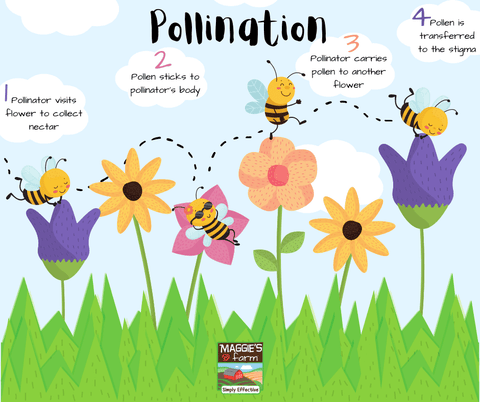Not all bugs are harmful to plants, and some are even beneficial. Pollinators help plants reproduce, which can help your garden grow and thrive. Certain things can make your garden more attractive to pollinators, so it’s important to set yourself up for success. Check out the best ways to attract pollinators to your garden.
What Are Pollinators?

Pollinators carry pollen on their bodies as they travel to different plants. When they drink nectar or feed on pollen, the pollen they’re carrying is transferred. This process aids in plant reproduction and helps flowers, vegetables, and fruits grow. Common pollinators include butterflies, bees, wasps, and even some species of beetles. Some mammals and birds are also pollinators.
Why Are Pollinators Important?

While some plants can self-pollinate, others cannot. These plants struggle to pollinate, which is how pollinators can help. Without pollinators, there would be a decrease in plants. This would reduce the supply of fruits and vegetables. It would affect the products made from produce and other plants too. These beneficial bugs are also important to the environment because they help to support ecosystems.
Tips to Attract Pollinators

Having pollinators in your garden can help ensure that your plants grow. To attract pollinators, you have to make your garden welcoming to them. We’ve made a list of tips to help you attract pollinators to your garden.
1. Choose Native Plants

When choosing plants for your garden, you’ll want to opt for native species. These plants will provide local pollinators with familiar food sources. Native plants are better adapted to the area, so they are likely to do well in your garden. You’ll also want to be careful when selecting hybrid plants. Some hybrid plants produce less nectar and pollen, which isn’t ideal when trying to attract pollinators.
2. Mix Up Your Plants

Pollinators prefer different plants. It’s important to keep this in mind when planning your garden. Mix things up and choose plants of varying colors and species. Place these in clusters to make it easier for pollinators to find them. Bees are known to be attracted to bee balm, dill, sunflowers, and mint. Butterflies like marigolds, butterfly bushes, yarrow, and lavender. You’ll also want to choose plants that bloom at different times of the year.
3. Provide a Water Source

Pollinators need water to survive, so you’ll need to provide a water source for them. Adding a birdbath or water feature to your yard can help attract pollinators. You could also place a shallow dish of water near your garden. Be sure to replace the water regularly because mosquitoes are attracted to stagnant water. Having pollinators is nice, but you won’t be able to enjoy your time outside with pests buzzing around.
4. Provide Shelter

Pollinators also need a place to rest or nest. Shrubs can provide pollinators with a break from the sun and wind. Trees can also create shaded spots and give bees a place to nest. Native species of shrubs and trees are ideal. Small piles of wood or branches can also act as shelter. Some pollinators may also find shelter in areas with bare soil or under leaves.
5. Be Careful Using Pesticides

When your garden is under attack from hungry pests, you may want to use pesticides. However, some pesticides can be harmful to beneficial insects. It’s important to choose a product that won’t harm these helpful bugs. Our plant-based 3-in-1 Garden Spray kills pests on contact and has residual repellent properties. It doesn’t leave behind harmful residues, which means pollinators won’t be harmed unless they are directly sprayed.
Before pollinators can help out, they have to find your garden. Choosing the right plants and providing them with food and water can make pollinators feel welcomed. Though some bugs are helpful, not all of them are. If you’re dealing with pests, we have your back! For a more environmentally and family-friendly solution, check out our Maggie’s Farm Simply Effective™ Pest Control products.
